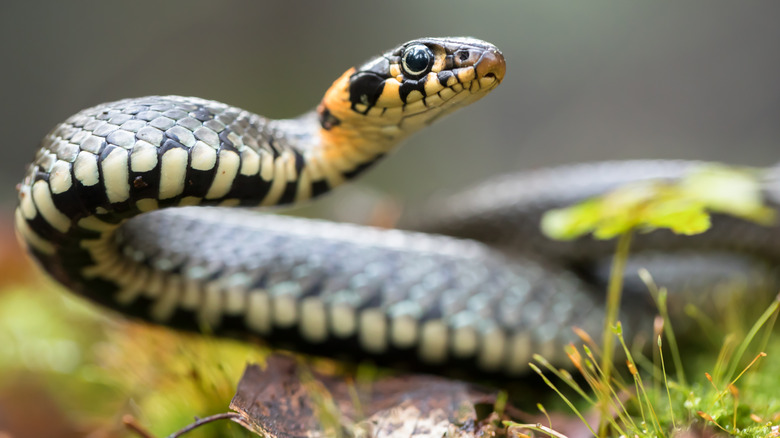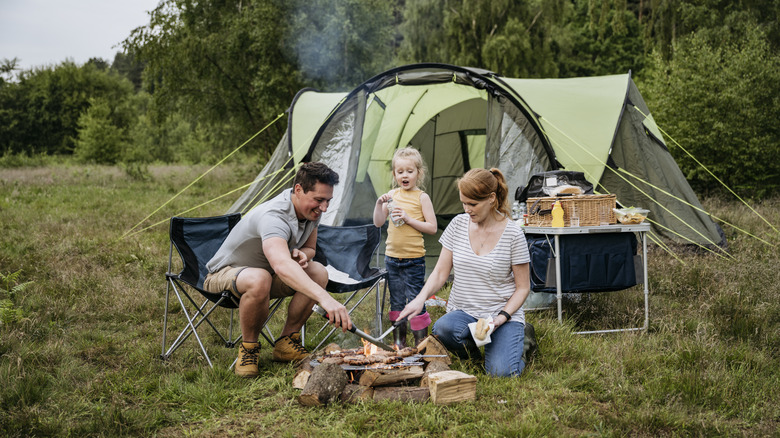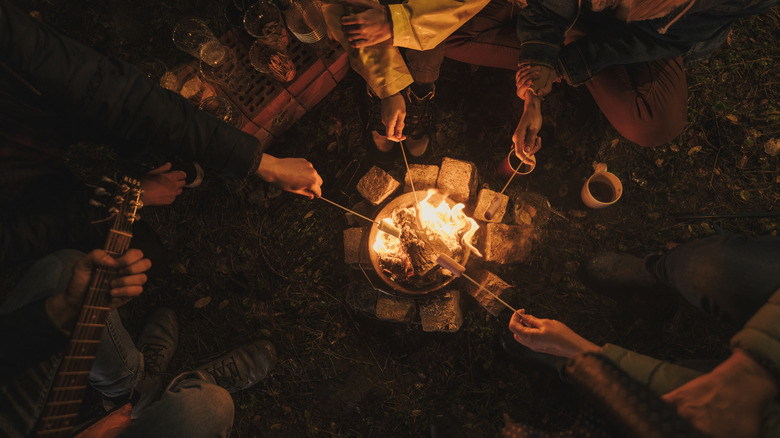The Best Ways To Keep Snakes From Slithering Into Your Campsite
While settling into your campsite and pitching your tent for the weekend, the last thing you probably want to see is a snake — especially when camping with kids or pets. Although many of the snakes you are likely to encounter aren't venomous; when adventuring in the wilderness of North America, there's always a chance of running into a copperhead, cottonmouth, or rattlesnake (here's what to do if you encounter a rattlesnake on the trail). Unfortunately, many of the options touted online as ways to repel snakes don't actually work. In fact, most commercial snake repellents sold in stores have been proven not to repel the slithering reptiles reliably.
While it has been proven that cinnamon essential oil can deter snakes, cinnamon oil is probably not something you're likely to have with you at camp. So, what can you do to reliably keep snakes out of your campsite without needing to bring an extra item? The solution is actually pretty simple and involves choosing a campsite without places for snakes to hide and keeping your campground clean and free of debris.
Choosing the campsite with the fewest snakes
The first step in protecting your campsite from snakes is to choose a site with the fewest number of snake hiding spots. This means trying to find a flat open area with little or no tall grass or rocky outcroppings. Because this is not always possible, you can try focusing on finding a site that has the fewest of the following: a water source, a wooded area, fallen trees, and piles of brush, leaves, or rocks. This is important because these are all places snakes like to hide out during the day. So, by limiting how many hiding places are in and around your campsite, you can lower your likelihood of encountering a snake.
If you can't find a campsite that fits all of these requirements, you can always clean up your chosen site to remove any snake hideouts before pitching your tent. You can do this by clearing brush, dead trees, leaf piles, and old wood piles. However, make sure to be careful while disturbing any possible snake hiding places. You should also inspect your tent before pitching it for any tears or holes that may allow a snake to enter and make sure to keep your tent doors and windows zipped at all times.
Important camp habits that help deter snakes
Once you've found a good campsite with the fewest snake hideouts, you can also do a few things while camping to deter any slithering reptiles from stopping by. One of the best ways to do this is to make sure you clean up all food scraps and trash. This is important because food scraps draw mice, rats, and birds — the favorite foods of many species of snakes and critters that will draw the slithering predators to your campsite looking for a meal. You should also avoid leaving any bowls of pet food outside as this will be sure to attract rodents. You should also be careful about how you store your trash and avoid keeping any trash bags outside (even if they are tied up). Instead, put your trash in airtight containers until you can dispose of it at designated campsite dumpsters.
Lastly, a good way to deter snakes is by keeping your campfire lit. This works because the heat of the campfire compared to the outside temperature can make snakes feel uncomfortable and keep them away. Campfires also provide light to help you see where you are stepping at night and can help you avoid accidentally placing your foot on a slithering serpent. If you aren't sure which species of snakes to look out for while camping, here are the types of snakes ranked by danger level.


